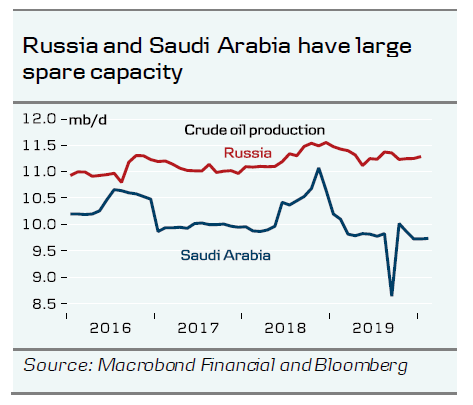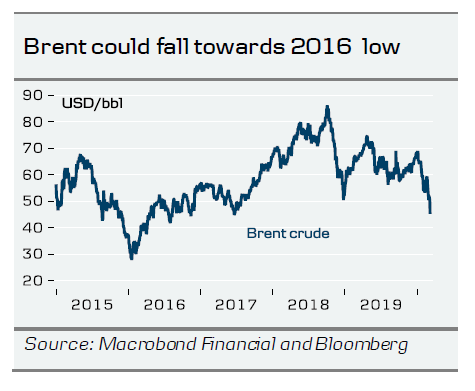- After Friday’s collapse in OPEC+ talks, the oil market could be facing a price war.
- Russia and Saudi Arabia have around 2-2.5mb/d in spare capacity they could use to drive down prices.
- The negative demand shock from COVID-19 and a possible positive supply shock could force Brent below USD30/bbl and down towards the 2016 low.
- We will review our oil price forecast when we send our FX Forecast Update in two weeks.
Friday’s collap se in OPEC+ talks on an outp ut cut and comments from Russia and Saudi Arabia afterwards have completely altered the outlook for the oil market. At the time of writing, what we know is the following. 1) The last official statement from OPEC was on Thursday, when the cartel proposed an additional 1.5mb/d of output cuts until the end of the year – 1mb/d from OPEC and 0.5mb/d from non-OPEC. 2) OPEC+ talks on Friday ended with no deal, hence no commitment from non-OPEC to the proposed 0.5mb/d of output cuts. 3) Talks broke down because Russia rejected the compromise; Russia’s oil minister Novak later said Russian comp anies are free to ‘p ump at will’ from 1 Ap ril. 4) Saudi Arabia quickly slashed crude prices and is now looking to increase output above 10mb/d in April from a current 9.7mb/d, potentially raising output to full capacity of close to 12mb/d.
Saudi Arabia and Russia probably have combined spare capacity of around 2-2.5mb/d. In an oil price war, UAE and Kuwait would likely also utilise their spare capacity , which is roughly 0.5mb/d in total. The rest of OPEC has limited spare capacity at the moment.
A rise in the short-term in world crude oil production of up to 3mb/d would have significant negative implications in normal times. In the current situation, where the oil market is faced with a significant negative demand shock due to the coronavirus’s impact on travel and trade activity, oil prices could experience a free fall with the price of Brent crude dropping below USD30/bbl and towards the bottom in January 2016 of around USD28/bbl.
Russia and Saudi Arabia have low production costs, but an oil price war is not a free lunch for either though. Russia would likely see its currency depreciate sharply to cushion the blow, while Saudi Arabia would have to draw on its reserves to cover large government exp enses. IM F estimates that Saudi Arabia’s fiscal breakeven oil price is above USD80/bbl, UAE’s is USD70/bbl and Kuwait’s USD54/bbl.
To put the events over the weekend into perspective: after the financial crisis in 2008, OPEC cut production by more than 4mb/d and held talks with Russia on the possibility of co-operation. It helped cushion the blow on the oil market and later paved the way for the surge in unconventional oil production, e.g. shale oil. An all-out price war would put significant pressure on producers outside OPEC with higher production costs
During the oil market sell-offs in 2008-2009 and 2014-2016, Brent dropped more than 70% from peak to trough. So far, Brent has lost 35% since the peak in January. We will review our oil price forecasts when we publish the next FX Forecast Update in two weeks.


